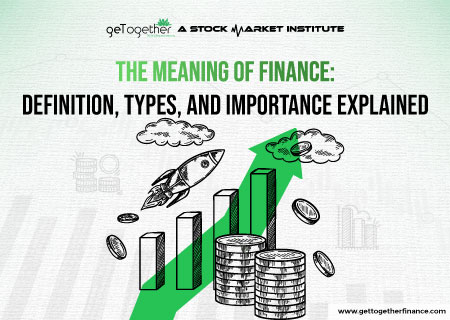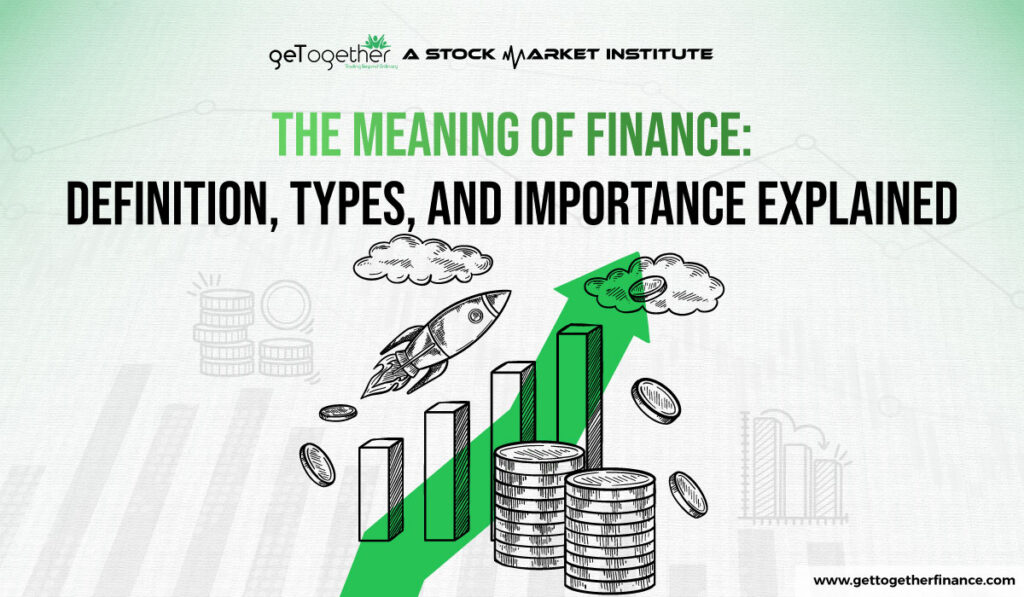What is Finance: Definition, Types, And Importance Explained


Finance is a generic term thrown around constantly in our day-to-day lives. While its definition may seem to differ depending on who you ask, it plays a crucial role at all levels of society.
For society at large, it’s the invisible hand allocating resources, driving development, and even managing the complexities of civilization. Businesses leverage finance as a tool to exchange services and products, gaining leverage to achieve their goals. For an ordinary individual, finance boils down to the essential skill of managing your money wisely. But what is finance and business finance?
But in the business world, finance simply includes management, creation, and study of capital and investment. In this blog, we will explore what is finance, business finance the history of business finance, and different types, and ultimately, its significance in our everyday lives.
Table of Contents
ToggleWhat is Finance?

In simple terms, finance is the way money moves around to meet different needs. People and businesses often need more money than they have available, and they borrow or sell ownership (equity) to get it. This could be to pay bills, make large purchases, or run a business
On the other hand, some people and businesses have extra money that they can invest. This can be done through things like savings accounts or retirement plans. This saved money can then be loaned out or invested in businesses, which helps those businesses grow.
Business Finance is the system that connects those with extra money (savers and investors) to those who need money (borrowers and businesses). Banks and other financial institutions act as middlemen, helping to move money from savers to borrowers.
In broader or academic terms, finance is the study and management of money, assets, liabilities, and other financial instruments. It involves the allocation of resources, creation of value, and management of risk. Let’s take a look at its history and evolution.
History of Finance: A Journey from Origin to Modern Advancement

The history of finance is a long and fascinating one, dating back to the earliest civilizations. Here’s a brief look into some of the major milestones:
Early Beginnings (3000 BC – 1500 AD)
The concept of finance can be traced back to Mesopotamia, where merchants used rudimentary forms of credit, loans, and bills of exchange. The Code of Hammurabi (1792 BC), one of the earliest examples of codified law, included provisions for debt repayment and interest rates.
The idea of money lending has existed in India for millennia. The Arthashastra, a 4th-century BC treatise on statecraft, discusses concepts of debt repayment and usury (charging interest). The ancient Sanskrit text Manusmriti (around 200 BC – 200 AD) lays down rules for interest rates on loans.
Rise of Banking (1500 AD – 1800 AD)
The development of banking institutions in mediaeval Italy marked a significant turning point. These banks facilitated trade by accepting deposits, making loans, and offering money exchange services. The Medici family of Florence was one of the most prominent bankers of this era.
The concept of money lending existed for centuries in India. The Shroffs (Sarafs) arose as a prominent community of bankers and money changers during the Mughal era.
Joint Stock Companies and Stock Exchanges (1600 AD – 1900 AD)
The establishment of joint-stock companies, where ownership was divided into shares, allowed for the financing of large-scale enterprises. The Dutch East India Company, founded in 1602, is considered the first publicly traded company. Stock exchanges emerged to facilitate the buying and selling of these shares. The Amsterdam Stock Exchange, founded in 1602, is the oldest stock exchange in the world.
The concept of joint-stock companies in India arrived with European traders. The British East India Company established a factory in Surat in 1615, and later, the Bombay Stock Exchange (now BSE), the oldest stock exchange in Asia, was founded in 1875.
What is finance in Modern Culture? (1900 AD – Present)
The 20th and 21st centuries have witnessed a dramatic evolution in the financial system. The creation of central banks, the rise of insurance companies and pension funds, and the development of new financial instruments such as bonds and derivatives have all contributed to a more complex and interconnected financial landscape. The advent of digital technologies has further revolutionized the concept, with the rise of online banking, electronic trading, and cryptocurrencies.
India gained independence in 1947 and established the Reserve Bank of India (RBI) as its central bank in 1935. The recent years have seen a digital revolution in Indian finance, with mobile wallets and UPI (Unified Payments Interface) becoming popular for cashless transactions globally.
This is just a brief overview of the history of business finance. There are many other important developments that have shaped the financial system as we know it today such as financial derivatives, etc. Over the years, finance has been recorded separately and separated into different classifications for better understanding.
What is finance with types?

Finance can be broadly divided into three distinct categories: public, corporate, and personal. More recent subcategories of finance include social and behavioural finance. Now understand what is finance with its types and business finance.
Public Finance
The term deals with the management of money by the government. It covers how governments raise money through taxes and other sources, how they spend that money, and how they budget for future expenditures. The main goals of public finance are to allocate resources efficiently, promote economic stability, and provide essential public goods and services.
Corporate or Business Finance
Business Finance or Corporate finance is concerned with the financial activities of businesses and corporations. It involves making decisions about how to raise capital, how to invest that capital, and how to manage a company’s financial risks. The main goal of corporate finance is to maximise shareholder value.
Personal
Personal finance deals with the management of money by individuals and households. It covers budgeting, saving, investing, borrowing, retirement planning, and estate planning. The main goal of personal finance is to achieve financial security and meet your financial goals.
Other categorizations are as follows:
Social
Social finance is a relatively new field that focuses on using financial tools to address social problems. It can involve activities such as microfinance, impact investing, and social entrepreneurship.
Behavioural
Behavioural finance studies the psychology of financial decision-making. It helps to explain why investors sometimes make irrational choices and how these choices can affect the financial markets.
Finance vs. Economics

Finance vs. economics, though interconnected, serve different purposes, especially in the context of scope, focus, and application.
Economics acts as the broader umbrella, examining how individuals and governments make choices with limited resources. It studies how goods and services are produced, distributed, and consumed, essentially reviewing the entire economic system.
On the flip side, finance drills down into the practicalities of managing money. This field equips people and businesses with the tools to make informed financial decisions, from budgeting and investing to navigating the complexities of the financial system.
Basically, economics provides the big picture of how resources flow through an economy, while finance equips us with the tools to manage our own piece of the pie. Hence, even by being the part of the same field, both finance vs. economics, grow crops of different natures. Here let’s take a brief and simplified overview of the basic difference between finance vs. economics:
| Feature | Finance | Economics |
| Focus | Managing money and investments | Studying how resources are used |
| Scope | Specific area within economics | Big picture of economies |
| Examples | Choosing investments, saving money, handling risk | Studying growth, prices, trade |
| Goal | Feeling financially secure, reaching financial goals | Understanding economic trends and choices |
| Analogy | Tools to take care of one tree | Studying the whole forest and how it works |
Key Finance Terms to Know

Now before we wrap, it is crucial to know a few important and fundamental financial terms that you need to know to even understand the basics of the finance field:
| Term | Simple Definition |
| Asset | Something valuable you own (like your car or savings) |
| Liability | Money you owe (like a loan or credit card bill) |
| Interest | The fee for borrowing money (loan) or the bonus for lending money (investment) |
| Risk | The chance of losing money on an investment |
| Return | The money you make from an investment |
| Budget | The government’s spending and income plan |
| Taxes | Money you pay to the government for public services (like roads and schools) |
| Fiscal Policy | How the government uses spending and taxes to affect the economy |
| Stock | A piece of ownership in a company |
| Bond | An IOU from a company or government, promising to pay you back with interest |
| Dividend | A share of a company’s profit paid to stockholders |
| Capital | The money a business uses to run and grow |
| Savings | Money you set aside for future needs |
| Investment | Putting your money to work to grow it over time (like stocks or bonds) |
| Debt | Money you owe to others (like credit cards or a mortgage) |
| Inflation | Prices going up over time |
| Market | A place where people buy and sell things (like a stock market) |
| Currency | The money used in a country (like dollars or euros) |
Conclusion
In a nutshell, finance or finance is a core concept of regulating our day-to-day life at different social, political, or economic levels. However, the debate is whether finance is an art or a science. Although it uses the tools and data analysis of science in areas like risk management and investment analysis which are heavily based on statistics and formulas. However, the human element plays a significant role as well. Investor emotions can influence market behavior and financial decisions. They often need judgment and intuition that go beyond strict scientific models. Perhaps the most accurate way to view the concept is as a blend of both, a discipline that requires a scientific foundation coupled with a healthy dose of artistic finesse.
FAQs
What are the career options in finance?
Finance offers diverse careers. Some options include financial analyst, investment banker, wealth manager, financial planner, loan officer, or risk management specialist.
What are some common financial mistakes?
Living paycheck to paycheck, not having an emergency fund, not saving for retirement, or taking on too much debt are some common pitfalls.
What are the best ways to manage debt?
Prioritise high-interest debts first, explore debt consolidation options, and create a plan to pay them down systematically.
What are the best ways to save money?
Reduce unnecessary spending, automate savings transfers, explore high-yield savings accounts, and consider cutting back on subscriptions or other recurring costs.
How can I improve my credit score?
Make on-time payments for all your debts, maintain a low credit utilisation ratio (amount owed divided by credit limit), and avoid opening too many new credit lines at once.



 Facebook
Facebook Instagram
Instagram Youtube
Youtube
